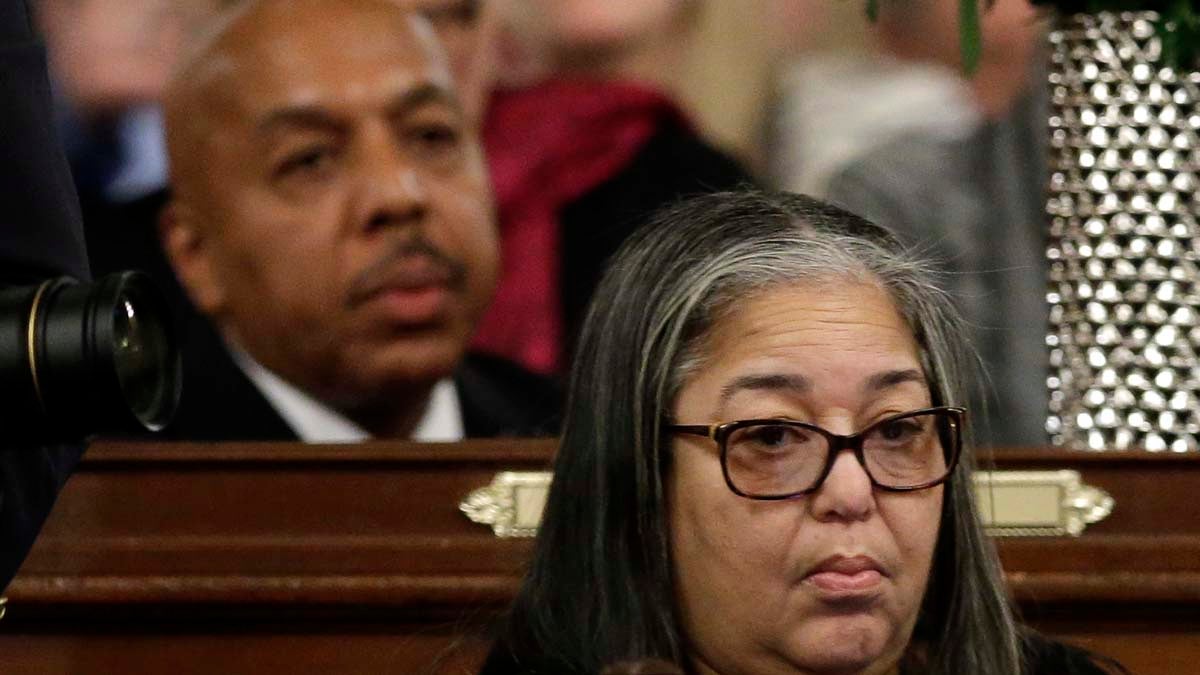Why do corrupt politicians keep their pensions?
Listen
State Rep. Ron Waters, D-Philadelphia, left, and state Rep. Michelle Brownlee, D-Philadelphia, are seen at their desks in January at the state Capitol in Harrisburg. Both have since pleaded guilty in a corruption sting and resigned their seats. They will keep their pensions.(AP file photo)
So how is it that a politician pleads guilty to accepting cash in an envelope and keeps his taxpayer-funded pension?
So far, three former Philadelphia state representatives — Ron Waters, Harold James, and Michelle Brownlee — have pleaded guilty in the infamous sting operation run by the state attorney general’s office. In all three cases, their plea deals will apparently allow them to keep their state pensions. I decided I just had to look into this.
It’s interesting, because nearly all of the politicians snared in the state corruption cases known as “Bonusgate” lost their pensions. But Eric Epstein, founder of the activist group Rock the Capital, which has been active on pension issues, said there’s a troubling trend in more recent cases, such as former state Sen. Leanna Washington.
“We’re riding backwards into the last century,” Epstein said in a phone interview. “If you look at the case of Sen. Washington, she pled out, kept her pension. Everybody involved in ‘Porngate’ kept their pension. We need to have a hard stop here.”
Why did the plea deals in the sting permit lawmakers to keep their pensions? Mark Gilson, the prosecutor who handled the cases, said pensions never came up in the plea negotiations.
“We never agreed that anyone gets to keep their pension,” Gilson told me. “Ultimately the decision whether anyone gets to keep their pension is a decision that needs to be made by the state board of pensions.”
And that’s true as far as it goes. But the pension board doesn’t have discretion here. State law provides that public officials forfeit their pensions when they’re sentenced on certain specific crimes – bribery, extortion, theft, and others.
William Costopoulos, a veteran attorney who’s handled many public corruption cases, told me a defendant’s pension is a key card to play in plea negotiations, and attorneys know which crimes cost clients their pensions — and which don’t.
“There are some ways to skin that cat,” Costopoulos said. “The way it works is the plea agreement is structured in such a way that what the defendant pleads to does not trigger the pension loss.”
And that’s exactly what happened here. The lawmakers pleaded guilty to conflict of interest violations of the state ethics code, offenses which don’t disqualify you from collecting your pension.
Plea deals and judgment calls
Assistant DA Gilson noted that the defendants are being punished — they’re giving up their seats and political careers and paying thousands in restitution and costs of prosecution. And he noted that they cooperated from the beginning in what he said is an ongoing investigation.
Asked why he didn’t insist they plead guilty to more serious charges, which would have stripped their pensions and led to jail time, Gilson said plea deals are always judgment calls.
“You look at your evidence. You look at the cost of going to trial. There’s always uncertainty there,” Gilson said. “There’s always a number of factors the Philadelphia district attorney’s office takes into consideration when it makes an offer to any defendant, and we obviously did what we felt was appropriate here.”
Gilson said it’s up to the legislature to require pension forfeiture for Ethics Act violations such as those the lawmakers pleaded to. Executive Director Rob Caruso told me the State Ethics Commission has recommended that to the legislature, but it obviously hasn’t happened.
Legal issues aside, is it fair to the lawmakers and their families to yank their retirement plans in these cases?
Costopoulous, the defense attorney, says he obviously has a bias, and it depends on the facts in every case, but he isn’t troubled by officials who’ve served honorably for decades keeping their pensions in cases where they accepted a few hundred dollars.
Epstein of Rock the Capital takes a harder line.
“If you want to defeat corruption, it’s clear — you send white-collar criminals to blue-collar prisons, and you take away their pension,” Epstein said. “And I don’t have any empathy when people say they did this, that and the other thing. No amount of good allows you to do any amount of bad.”
Two other lawmakers, state Reps. Louise Williams Bishop and Vanessa Lowery Brown have not reached plea deals in the case, and may choose to go to trial.
WHYY is your source for fact-based, in-depth journalism and information. As a nonprofit organization, we rely on financial support from readers like you. Please give today.


